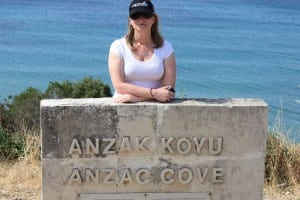Each year I revisit this post around Anzac Day (25th April). Every ANZAC day reflections / lesson is still valid. In 2023, these lessons are perhaps more valid than ever as we tackle a time of global uncertainty following the largest pandemic since the Spanish Influenza pandemic that followed World War One and another conflict involving trench warfare in Europe (Slava Ukraina!).
I’d love your feedback – which tourism lessons resonate for you? Which should I add?
Powerful experiences lead to deep reflection
In September 2012, I visited the Gallipoli peninsula and the sites of the Gallipoli offensive. It was for me an incredibly moving experience.
My grandfather fought in what, as a British-born Australian, I would call the Dardanelles offensive.
He spent his 15th birthday (17th September 1915) there racked with dysentery. He was with the British (or rather Irish) forces. Most tours of the Gallipolli peninsula are quite Australian-focused so we didn’t visit the actual beaches where he was. But as I was there on the peninsula 97 years after he was (just one day before his birthday) and could see those beaches, I felt him very close and wondered what a 14-year old farm boy from Portadown, County Armagh would have made of this hot, dry but beautiful place.
Visiting Anzac Cove (that’s me above) the words of Gitta Sereny about the Treblinka death camp came to my mind. She was struck by the ‘terrible smallness’ of that place. And besides its dazzling beauty, that accurately describes Anzac Cove as well.
But standing in the place of such terrible events makes for deep reflection as well. And many of them seem very relevant to tourism businesses today.
3 key lessons that stood out for me
Among the learnings that stand out for me are:
- the role of good intelligence (research?) overall;
- the importance intelligence in enabling us to see the world as it is rather than as we would like it to be (insight?); and
- the need for a plan that has flexibility about how to meet your objectives when circumstances change.
Besides military campaigns, these are all good lessons for tourism businesses.
Intelligence enables us to see the world as it is – not as we want it
I regularly hear in business how people prefer to trust their instincts over intelligence or research. That to a certain extent was what happened in Gallipoli and it affected the outcome of the campaign in many ways.
Churchill saw the world as he wanted it to be. Despite the evidence of the bravery of Turkish troops in the Crimean war, he saw an ailing country wouldn’t have the guts to defend itself.
As we seem to want to return to a 2019 Business as Usual (BAU) in the face of global uncertainty and accelerating climate change the need to see the world as it is has never felt more vital.
An outside in perspective brings cognitive diversity
Similarly, he failed to follow advice that I give businesses all the time. I call it the ‘Atticus Finch’ school of business thinking after the hero of Harper Lee’s novel ‘To kill a Mockingbird’. If you want to understand how people will react and behave, you need to ‘walk a mile in their shoes’. This meant that Churchill and the other military planners (and it could be said Putin and his planners) failed to think what even an under-resourced opponent might do when faced with the invasion of their land.
The insane bravery of the Turks in defending their land thus came as a surprise to the planners. It came forcibly to me hearing a Turkish Guide saying Ataturk’s words to the 57th regiment…
‘Men, I am not ordering you to attack. I am ordering you to die. In the time that it takes us to die, other forces and commanders can come and take our place.’
Aside from the business lesson it fills me with such complex emotions.
Not the least of these is what it meant to be one of those young men who fought with no hope for themselves. But it was undoubtedly a defining moment of the campaign.
Another fatal flaw was a lack of intelligence about the lay of the land. Today it seems blindingly obvious to anyone that Anzac Cove is a crazy place to land a major body of troops.
And whilst that beach might have been a mistake (as some histories claim the tide took them away from their main objective), if that is what happened it also reflects a lack of good intelligence. If you’re attempting a beach landing an understanding of the tides is usually a good thing to have!
Prepare for the unexpected and the worst
Finally, I learnt one thing on that tour about the British campaign that really made me want to weep.
The British soldiers actually achieved their initial objective of a high point quite quickly on the first day of their campaign. However, they lost most of their officers on the way and so dropped back to get orders. They never regained that high point and the attempt to do so cost many thousands of lives.
When taking high risk or high cost decisions it pays to have a scenario plan. This was a point Intrepid Travel made forcibly in their webinar for The Bhive in 2020, not only should you scenario plan but you should aim to make sure you know what your worst case scenario is – and whether you can survive it.
Empower your teams
The story also demonstrates how important it is to equip everyone in a team with the resources and information to do what is needed in unusual (but surely not unpredictable) circumstances. Too often businesses make this same mistake of guarding knowledge.
Celebrate courage – but try NOT to need it
This is not to decry the courage and ingenuity of those young men on the ground – whatever the nation. In war as in business, there are plenty of situations that will draw on such skills even in the best-planned and most informed organisations.
But let’s minimise the need for them under most circumstances and save them for when they are unavoidable elements of meeting our goals.
As a researcher and business advisor, that’s what I try to do every day of my business life. I’m not trying to compare the scale of what we do in everyday business to what the Anzacs did. It’s more to say that those extreme circumstances can provide lessons for all of us.
I’d like to think my grandfather (who adored me but being a tough old NCO couldn’t show it) would be proud that I learned something from his terrible experiences.
Enjoy (if that is the right word) your Anzac Day.
Do you want to hear more from us?
Want to be kept up to date with the latest travel and tourism insights? Join Our Mailing List. Every 2 weeks, we send the latest practical insight for you to apply to your business and destination marketing.





Fascinating, Carolyn! It comes at me as I sit here on a Sunday morning preparing a talk reflecting on Mary MacKillop as a entrepreneur. I’m on the board of the MacKillop Museum in Adelaide and got pinged to do a talk as part of the SA History Festival. I’m taking an entirely secular slant, using observations from my tourism industry experience. Reading this was handy!